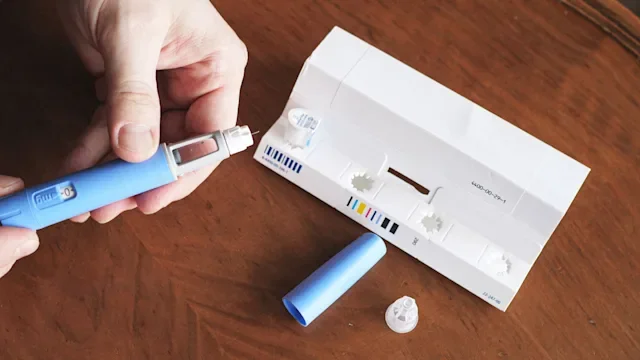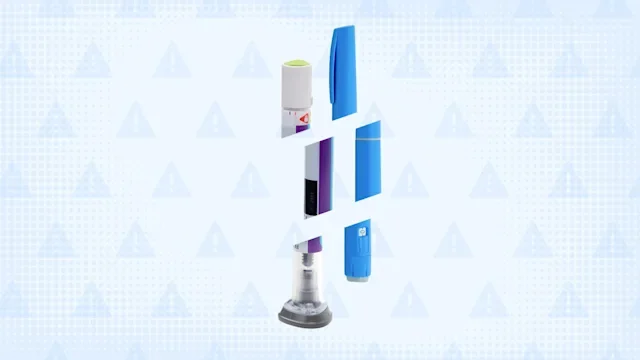Key takeaways:
Byetta (exenatide) is an injectable medication used to lower blood sugar in people with Type 2 diabetes.
Byetta can slow down how long it takes some oral medications to move through your stomach. This may affect the way they work for you.
Some interactions can be managed by changing how you take your medications. Speak to your pharmacist about possible Byetta interactions and how to manage them.
Save on related medications
Byetta (exenatide) is a medication that’s FDA approved to improve blood sugar levels in people with Type 2 diabetes. It’s prescribed along with a healthy diet and exercise, and you usually inject it under your skin twice a day.
One of the ways Byetta works is by slowing down the time it takes your stomach to empty. But if you’re taking oral medications, this effect might slow them down, too. And it’s possible that you may not absorb them as well into your bloodstream.
Many Byetta interactions are a result of slower absorption. Others are due to additive blood sugar-lowering effects. We’ll discuss some of the interactions you should know below.
1. Oral antibiotics
Some antibiotics need to reach a certain level in your body to work properly. One example is fluoroquinolones, which include antibiotics like ciprofloxacin (Cipro), levofloxacin, and moxifloxacin (Avelox).
After you take Byetta, your stomach empties more slowly. This can prevent antibiotics from getting absorbed into your bloodstream as quickly. And lower antibiotic levels could mean your infection won’t be treated as well as it should be.
If you’re prescribed an antibiotic with Byetta, take your antibiotic at least 1 hour before your Byetta injection. This may help you absorb the antibiotic before Byetta slows down your stomach.
What’s more, fluoroquinolones can potentially affect your blood sugar. So, your levels may not be as controlled if you’re taking one with Byetta. Because of this, it’s important to monitor your blood sugar regularly during treatment. Let your healthcare provider know if your readings are higher or lower than usual.
2. Diabetes medications
On its own, Byetta doesn’t usually cause low blood sugar. That’s because it only stimulates insulin release in response to meals. However, you may be prescribed other diabetes medications with Byetta for additive effects.
With some combinations, your blood sugar may get too low (called hypoglycemia). This is especially risky with insulin and insulin-releasing medications, like sulfonylureas and glinides. Symptoms of hypoglycemia include fast heartbeat, sweating, and shaking. Severe hypoglycemia can be life-threatening.
Not all diabetes medications are known to have the same hypoglycemia risk with Byetta. But if needed, your healthcare provider may adjust the other diabetes medication when you start taking it. This can help reduce your risk of low blood sugar.
It’s important to regularly monitor your blood sugar levels during treatment. This helps to ensure you’re within your target range. Let your healthcare provider know if your readings are lower (or higher) than normal. If so, they may need to make further adjustments to your regimen.
3. Birth control pills
If you’ve ever taken a birth control pill, you’ve probably been told to take it at the same time every day. And if you’re also taking Byetta, timing is essential to avoiding a potential interaction.
Researchers have found that taking the pill too close to your Byetta injection can slow its absorption into your body. This could mean the pill might not work as well to prevent pregnancy.
The good news is that this interaction can be easily avoided. You should take your birth control pill at least 1 hour before your Byetta dose. This will allow your body to absorb it before Byetta starts slowing things down.
4. Warfarin
Warfarin (Coumadin, Jantoven) is a blood thinning medication that’s used to prevent and treat blood clots. If you’re taking warfarin, you likely already know it can interact with foods and other medications. It also requires frequent blood work to ensure your dosage is safe and effective.
Byetta can potentially interfere with how much warfarin you absorb. Too much warfarin can lead to bleeding. And too little warfarin can increase the risk of blood clots. Some people have reported bleeding with this combination.
When you first start taking Byetta, your healthcare provider may monitor your warfarin blood work more frequently. Monitoring is also important if your Byetta dosage is adjusted, or if you stop taking it. Once your blood work is stable, you’ll typically go back to your usual monitoring schedule.
If you’re taking this combination, let your healthcare provider know if you notice any new or unusual bruising or bleeding. This might be a sign your warfarin dosage is too high.
5. Other oral medications
Byetta hasn’t been studied with all medications to check for interactions. So, other interactions may be possible. In addition to birth control pills, certain antibiotics, and warfarin, Byetta may affect how other oral medications are absorbed.
For example, a medication that needs to work quickly may take longer to kick in. Or it may be absorbed too slowly to reach high enough levels in your body. Because of this, it’s typically recommended to take an oral medication at least 1 hour before your Byetta dose.
Your healthcare provider can review your medication list and determine how to manage potential interactions.
When should I contact my healthcare provider about a Byetta interaction?
Contact your healthcare provider if you’re ever concerned about a Byetta interaction. This is especially important when starting, adjusting, or stopping another medication. Your pharmacist is also a great resource for information about interactions.
You may be more likely to experience hypoglycemia if you’re taking Byetta with other diabetes medications. And it’s important to recognize and treat hypoglycemia quickly if it happens. But if your blood sugar readings are lower than they should be, contact your healthcare provider. They may need to adjust your regimen.
For your safety, never make changes to your medications without talking to them first.
The bottom line
Byetta can potentially interact with other medications you’re taking. Luckily, many Byetta interactions can be managed. Some can be avoided by separating your Byetta dose from when you take oral medications. But others may require dosage changes.
Your healthcare provider can determine which Byetta interactions may potentially affect you and how to manage them.

Why trust our experts?



References
Althaqafi, A., et al. (2021). How safe are fluoroquinolones for diabetic patients? A systematic review of dysglycemic and neuropathic effects of fluoroquinolones. Therapeutics and Clinical Risk Management.
AstraZeneca Pharmaceuticals LP. (2022). Byetta [package insert].
Brice, K. A., et al. (2011). The clinical efficacy and safety of glucagon-like peptide-1 (GLP-1) agonists in adults with type 2 diabetes mellitus. Clinical Medicine Insights. Endocrinology and Diabetes.
Hira, T., et al. (2021). Improvement of glucose tolerance by food factors having glucagon-like peptide-1 releasing activity. International Journal of Molecular Sciences.
Kothare, P. A., et al. (2012). Effect of exenatide on the pharmacokinetics of a combination oral contraceptive in healthy women: An open-label, randomised, crossover trial. BMC Clinical Pharmacology.
Levison, M. E., et al. (2009). Pharmacokinetics and pharmacodynamics of antibacterial agents. Infectious Disease Clinics of North America.
Lode, H., et al. (1998). Pharmacodynamics of fluoroquinolones. Clinical Infectious Diseases.

















